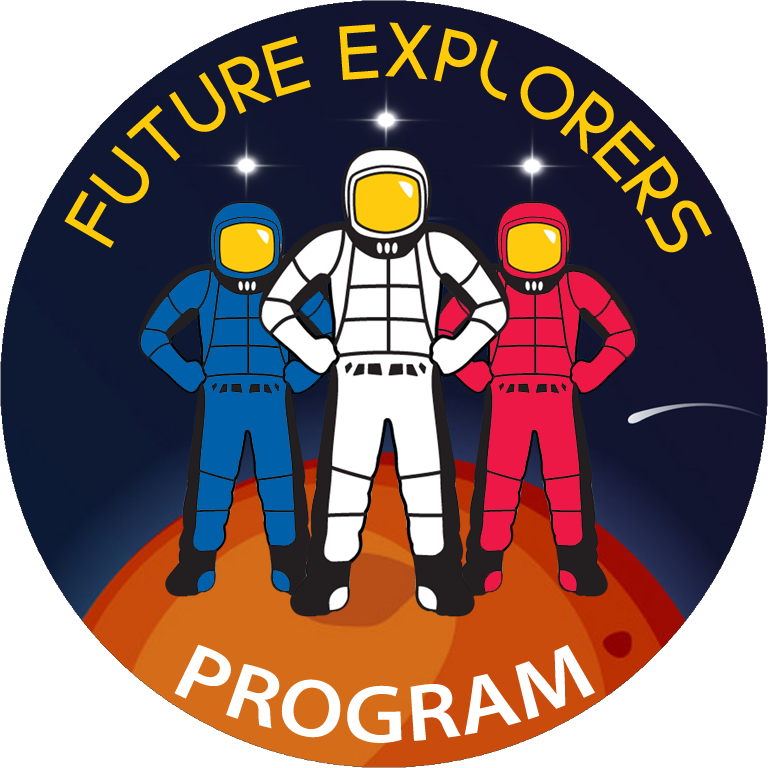The Future Explorers Program (FEP) uses space education to broaden their understanding of the world by connecting teachers and students with Space Camp Turkey. The program utilizes the Digital Learning Center, collaborative research, hands-on science, and space education as tools to inspire students to understand topics related to Science, Technology, Engineering, Arts, and Mathematics (STEAM). The curriculum is designed to encourage students to explore both their potential and the vast universe and foster their development as the next generation of explorers.
Program Components:
- NASA-Based Educational Materials Study (mandatory): Participating in NASA-based space education projects is a key component of the program. These NASA-inspired educational materials are available online for students to explore. The study of these topics will be seamlessly integrated into regular school hours or may be undertaken as an after-school activity, depending on the discretion of the teacher and how it fits into the overall curriculum. This provides flexibility in application while providing students with a rich and immersive learning experience based on original NASA resources. Educational projects cover a variety of space-related topics and allow students to delve into specific areas of interest and expand their understanding of space science. Teachers play a crucial role in guiding students through this exploration, fostering discussions, and seamlessly integrating NASA-based content into the curriculum. This mandated study acts as a gateway for students to tap into the latest insights from NASA, elevating their knowledge and fostering a heightened enthusiasm for space education.
- Videoconference Sessions (mandatory): Engaging in two-way videoconferencing with Space Camp Turkey and the participant school offers a valuable opportunity for participants to directly interact with experts and meaningfully personalize their work. During videoconferences, students have the chance to present their science projects to the Distance Learning Expert, receiving real-time feedback.
- Participating in Future Explorers Summit Week at Space Camp Türkiye (highly recommended): Program participants are encouraged to attend a special six-day session at Space Camp Türkiye in August, known as Future Explorers Summit(FES). During this session, campers strengthen their connections by interacting with students from various countries and showcasing their team projects in a “Science Fair.” Optionally, To be eligible for the "Future Explorers Summit" at Space Camp Turkey, participating schools are required to undertake a minimum of five projects.
PREREQUISITES
- Age Group: Students from participating schools must fall within the 12-15 years age range.
- Language: Proficiency in the English language is a program requirement, and all communication will be conducted in English.
- Class Size: Each school's class or group size should comprise a minimum of 15 students but should not exceed 30 students.
Technical Requirements:
To ensure a seamless and productive participation experience, the program necessitates the following technical specifications:
- Ensure a High-Speed Internet connection, preferably through an Ethernet connection. This helps maintain a stable and reliable connection, minimizing disruptions during online activities.
- Ensure a digital camera is available to capture and share visual elements that are an integral part of the program
- Verify the capability for videoconferencing. This feature enables real-time interaction, fostering effective communication and collaboration among participants.
EXPECTATIONS
To be eligible for inclusion in the program, all teachers and school principals must express their commitment to fulfilling the following requirements for active participation in the Future Explorers Program:
Active Participation:
- Committing to participating in the Future Explorers Program (FEP) for one academic year.
- Leveraging the online NASA-based educational materials available at to select and study relevant topics
- Undertaking a minimum of five topics from the curriculum during the school year
Videoconferencing:
- Ensuring access to a videoconference facility, either at school or elsewhere.
- Coordinating dates and times for videoconferences the operating hours of Space Camp Türkiye.
- Booking the VC through the "Book your VC" panel on the GFTSE website at least 36 hours before the scheduled date and time to schedule a videoconference appointment with the Distance Learning Expert.
- Participating in at least five videoconferences
- Following and completing the lesson plans for each topic provided by GFTSE.
- Informing the students questions about the project to the Distance Education Specialist before the video conference and preparing the students for the video conference.
Documentation:
- Maintaining detailed documentation of correspondence and testimonials from students and teachers throughout the school year and following FES Week.
- Keeping an organized record of FEP projects and supplying GFTSE with photos, projects, and updates for publication on the GFTSE website and social media pages.
Participating FES Week:
- Initiating early communication with parents to raise awareness of the possibility of joining FES Week at Space Camp Türkiye, along with associated costs.
- Making concerted efforts to bring a minimum of five students to FES Week, understanding that future participation in FES hinges on the capability to involve students in this event.
- Bringing and showcasing FEP projects during the Science Fair at Space Camp Türkiye, typically featuring one of the year's FEP topics offered by schools.
Our program has a limited number of available slots. For applications or more detailed information, please feel free to contact Yiğitberk Siper, our Distance Learning Expert, yigitberk.siper@gftse.org, or Nurcan Subasi, the Team Leader for Educational Outreach, at nurcan.subasi@gftse.org


